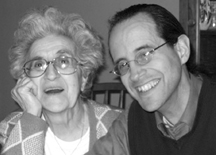|
|
|
The
Art of Living Now:What’s in a Name?
 by John Calabrese • Huntington
by John Calabrese • Huntington
Let
me respectfully remind you, life and death are of supreme importance.
Time swiftly passes by, and opportunity is lost. Each of us should strive
to awaken… awaken. Take heed, do not squander your life.
— Evening Gatha,Zen Mountain Monastery
"It’s only a matter of time." The sentence banged around
inside my head driving home on the LIE after spending the afternoon with
my mother. A year ago, she was on her own, but just barely. Now she resides
in assisted living as dementia slowly takes its toll– and next year,
possibly a nursing home. It is only a matter of time before she will forget
my name.
For years, she asked me about taking her to see Colorado, where I used
to live. "It looks so beautiful out there," she’d say,
her wanderlust spirit roaming over a mental picture formed only from postcards
of my travels. That journey would’ve been so easy for us in the past,
before my schedule shifted to warp speed. But, like so many other things,
I put it off, thinking there would always be time. This became one of
life’s gut-wrenching lessons: Stop putting things off until the circumstances
are "right," because you or someone you love may be dead or
delusional before that time arrives.
We’re all in denial to some extent. We think that certain mishaps
will only happen to other people, or that we can wait until such-and-such
a time before doing the things we yearn to do. Picture Denial as the kid
brother of Delusional, and you quickly realize the potential it has to
steal your dreams and take away from the quality of your life, moment
to moment.
Buddhists have developed a way to grab hold of denial– in this case,
the idea that there will always be time– and smash it to pieces.
Doing the Nine Point Meditation on Death may sound morbid at first, but
eventually it compels us to accept that there really is no tomorrow, only
today. We are so conditioned to being preoccupied with the future, either
by worrying about it or planning our lives around it, that death is often
relegated to a footnote. Accept death, the Buddhists say, and you can
live more fully today, when it really counts.
In the past, I was rooted in frustration about my mother’s condition.
Each new infirmity would ignite the fear of her mortality. Since that
was too much to bear, I’d displace this fear onto her by becoming
impatient. In a swirl of distorted thinking, I acted as if I thought that
showing disapproval with her aging process would somehow get her to stop
"doing" it. All it did was cause both of us more anguish.
Now, instead of agonizing over how much time is left and how bad she’ll
get before "the end," I have a tool to enjoy my mother’s
last years. It helps to realize that my frustrations were based on fear,
not love– and with each gradual, incremental loss of functioning,
I have the choice to cave in to fear or create more love. This new way
is a lot simpler and works much better: Whenever she says or does something
silly, or makes one of her "unique" observations, I smile and
we both wind up laughing. One day, as we entered a large electronics store,
my mother froze and yelled "Cake!" I turned around, dumbfounded.
"Cake?" I asked her. "What are you talking about? This
isn’t a bakery!" Staring intently, she pointed to a nearby table
with shrink-wrapped electronic equipment that had been returned without
a box. Somehow it had filtered through her distorted perception as cake.
Amid the mental debris of senile dementia, there are still so many things
to be grateful for. Her sense of humor remains– one day, an aide
came to get mom for lunch and found her lying on the floor where she had
tripped. She was laughing even though she’d been there for over an
hour. Another blessing is her consistent, upbeat attitude: I have no memories
of my mother acting mean, depressed or negative. She has always loved
hugs and car rides (and always asks if we’re going somewhere,) and
there are still plenty of times when I’ll catch her bopping to Led
Zeppelin or Steppenwolf.
Life is indeed a house. With each bit of life my mother releases, one
more crack appears in my foundation. When she dies, that foundation will
certainly crumble. But, just as happens with the Amish barn-raisings,
I know that the people who love me will help rebuild the man she had a
huge hand in creating.
What’s in a name? Everything, especially when your mother can’t
remember yours anymore.
John Calabrese is a transpersonal psychotherapist with a private practice
in Huntington. He specializes in transitions, separation and divorce,
career changes, effective communication, relationships and couples counseling,
and spirituality. For a free telephone consultation, call 631-549-4852
or email: TransPsych1@aol.com.
|

